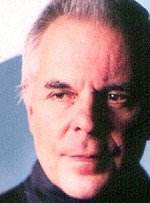
The Moonlight proved an ideal starter to acclimatise the large Festival
Hall audience to Stephen Kovacevich's way with Beethoven. Dressed
informally for a hot afternoon, he sat still, hands low. The pulse of the
famous slow opening movement was steady, dynamic level low throughout, chording
explored with expressive shading responding to harmonic shifts, as it was
to throughout the recital. It served as a quiet 'toccata' to establish the
feel and 'touch' of the instrument, a way I had not thought of for that
'hackneyed' piece in every amateur's repertoire, and to draw listeners in.
Not a single cough until Kovacevich 's short, but regrettable, pause (the
movements are marked attacca, as Nick Breckenfield's excellent notes
made clear) before the relaxation of the brief allegretto, which in
turn was swept away by the whirlwind finale, despatched in a single furious
span during which one could not take a breath.
This set the scene for Kovacevich's approach. As we had learnt at his enthralling Master Class, structure, appreciation of harmonic movement and Beethoven's rhythmic dislocations are all important in his approach, but 'beautifu'l tone & complete clarity less so. He discussed nervousness (something to which he is not a stranger) with each 'victim' and told one student not to be 'too considerate, too musical', another to 'make sure the chromatic implications come through - be careful not to be too expressive and conventional', then 'prestissimo means extreme - it shouldn't be comfortable for anyone, player or listener - it needs some sense of danger'. These dicta were in the back of my mind as I listened, and they clearly informed his playing.
The four movement Eb sonata was approached similarly, with zest and not too much concern for us to hear every note. The finale, which has something in common with those Schubert finales with triplet quaver accompaniments, was here unmistakably Beethoven with its sudden eruptions and a driving presto con fuoco. To settle us (and himself) for the Everest of the piano repertoire, Kovacevich gave us a couple of the Op. 119 Bagatelles, played with limpid simplicity which made us wish for more (the programme notes discussed all eleven). Op. 111 received a noble, inward looking account, which banished all comparisons in a collective, shared experience, so different from playing a CD at home, however fine. Stephen Kovacevich was in fine form that afternoon, and his realisation of the cumulative, continuous Arietta finale balanced the span of the whole with some extraordinary rhythmic detail on the way, culminating with superbly controlled trills in the fifth and sixth variations. At the finish he held his hands still just above the keyboard in a gesture to us to hold back our applause for contemplation - uselessly, the silence was immediately destroyed by an insensitive 'me first' clapper - there's always one of those. The audience demanded an encore - and got none! Quite right too.
Then there was the increasingly obligatory CD signing session at the record shop (his new CD includes the Moonlight Sonata (EMI 5571312 ). Mercifully, at this Harrods International Piano Series recital there was no distracting screen for the audience to 'watch the hands' more closely, as if on TV.
Peter Grahame Woolf
Stephen Kovacevich ends his Beethoven series on South Bank with the London PhilharmonicYouth Orchestra on 22 May. His open rehearsal of Concerto No 1 & Symphony No 7 is at 2.30 p.m. - free by ticket (www.sbc.org.uk).
 Return to:
Return to: